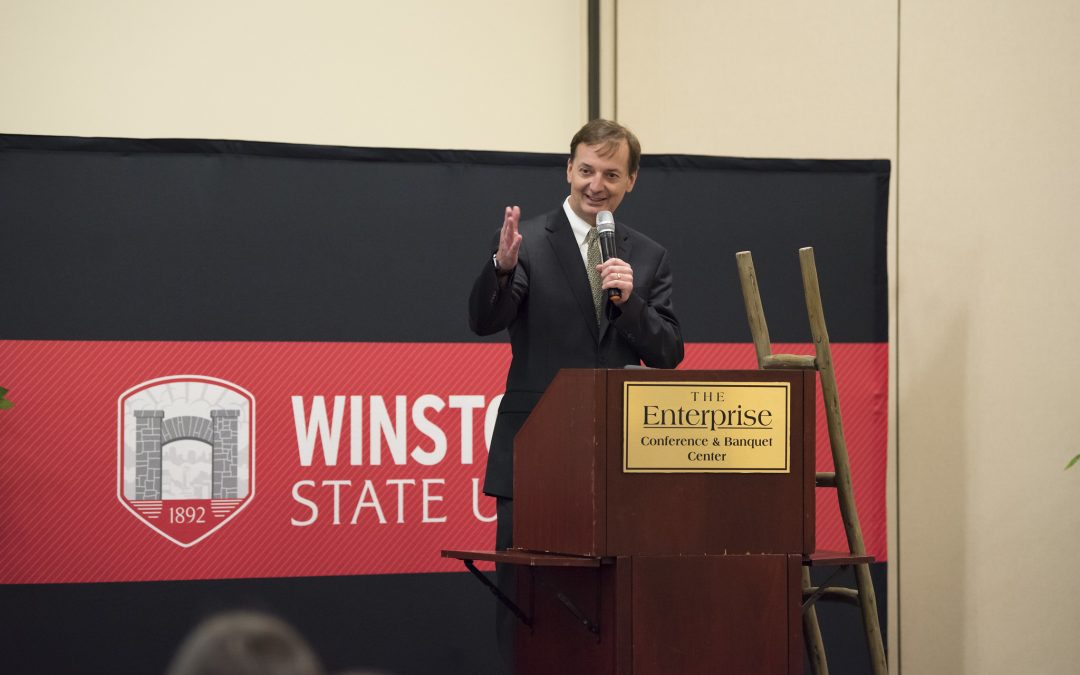Here at CSFE, we hope everyone had a great Thanksgiving holiday. Earlier last week, CSFE Content Marketing Specialist, Allie Todd, talked with Craig Richardson. As Director of the Center for the Study of Economic Mobility (CSEM) and the BB&T Distinguished Professor of Economics at Winston-Salem State University, Craig oversees the center’s research team of eleven CSEM Faculty Fellows and works with Associate Director Alvin Atkinson on community outreach and student internships.
The mission of CSEM is focused on exploring the causes for the extraordinarily low economic mobility in Forsyth County, North Carolina, where Winston-Salem State University is located. It seeks to implement programs to enable people to gain economic mobility. Craig noted, “We have an interdisciplinary center, but it has economics at its heart. If you’re born poor here, it is hard to get out of poverty, so CSEM was founded on the idea of the metaphor of a ladder of economic mobility. What are those missing rungs, or broken rungs, that keep people from ascending, and what might be some policy changes or some private sector initiatives that could enable people to ascend that ladder?”
Recently, CSEM made a documentary titled, “Bus Stop Jobs,” that tells the story of the typical day of a bus rider in Winston-Salem, which aims to shed light on the juggling act of working and raising a family all while enduring the long bus commutes each day. “This has led to the local Winston-Salem Foundation, which is the largest foundation in the area, giving close to $200,000 in innovation and transportation grants to eight different organizations in the county, which have now explored their own ideas,” said Craig.
CSEM is dedicated to not only researching the gap in economic mobility in Forsyth County but with that research, creating a tangible, positive change. Craig’s vision with CSEM is to be an independent source of information for Forsyth County, providing other area organizations useful data that shows what works best at reducing poverty.
“Our vision is to look at long term solutions to poverty and enable people themselves to lift themselves up. But we must also be aware of what those hurdles are that have been put in place that keeps people from doing that,” said Craig. “So, we start from the perspective that people aren’t passive, people aren’t lazy, they’re hard-working at the bottom of the ladder, just like they’re at the top. The vision is to allow them to have the same opportunities to achieve the American dream as everyone else does. We do that with an interdisciplinary research approach that enables us to have our talented Winston-Salem State faculty giving light to these problems from different points of view.”
The missions for both CSFE and CSEM are similar, and there have been multiple times where our paths have crossed. Our Director, Edward Lopez, has been working with Craig and CSEM on Covid-19 research this fall, along with previously working on policy reports together, “This has been a great collaboration, both formally and informally,” said Craig. We’re researching some of the same basic questions of economic opportunity and mobility but in different contexts. Craig has brought a lot of clarity and attention to problems in urban settings. We’re working to fill that gap in rural, mountainous settings like WNC.
Going forward, CSEM’s latest research fellows are working on upward mobility for the previously incarcerated, as well as improving economic mobility for the disabled. Another project, led by Craig, is a first of its kind project for Forsyth County: it analyzes the economic benefits of Forsyth County’s first-time homebuyers’ program for low-income individuals and families. Although more than 800 families have benefited, prior to CSEM, there had never been an analysis of the return on investment. Early results of the empirical analysis indicate that for $1 the government spends on down payment assistance, these beneficiaries gain almost $9 in accumulated wealth through housing equity, which puts them on a very different path than renting a house. “Notably, because of government regulations through the Dodd-Frank bill, it is nearly impossible to get a mortgage for less than $70,000- banks don’t find it profitable any longer. So, programs such as these can help as a second-best solution,” Craig noted.
The second project is partnering with a software developer to develop a program that helps low-income individuals navigate the maze of social welfare, which typically punishes those who work harder or get raised through substantial rollbacks in aid. “Oftentimes, people can get say, a raise from $10 to $12, but they end up making no more money,” Craig said, noting, “The poor get the lowest reward for working if they end of up on welfare programs, facing “disincentive deserts.” He aims to work with local employers to come up with creative solutions that sidestep these disastrous poverty traps and allow them to give incentives that promote upward economic mobility.
We are proud to work with Craig and CSEM, and excited to see what comes next for them.

